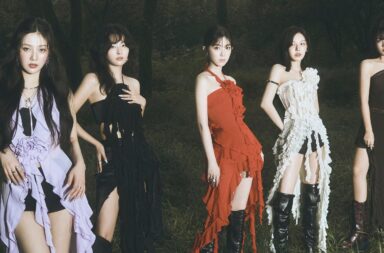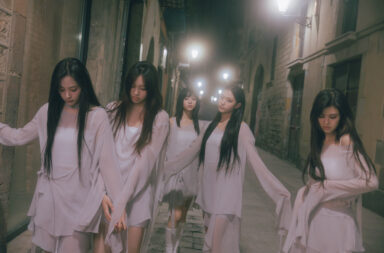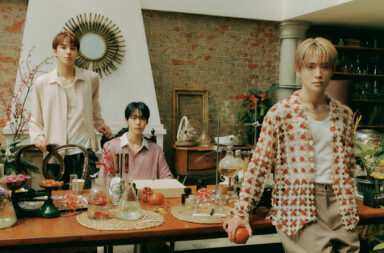 2012 has been a prolific year for K-pop — and we’re only halfway through. Here are our picks for the top three albums or mini-albums from the first half of 2012.
2012 has been a prolific year for K-pop — and we’re only halfway through. Here are our picks for the top three albums or mini-albums from the first half of 2012.
Dana:
My personal pick for best mini-album would be (and I’m sure this will surprise approximately no one) SNSD TaeTiSeo‘s Twinkle. Now, now — before you all jump down my throat and accuse me of being an abhorrent SONE who blindly adores every single product that her beloved nine angels produce, give me a chance to explain myself. I actually have actively punished SNSD in the past (I’m sure it was very effective) for producing sloppy work; I refused to purchase the entire The Boys album, since I felt that more than half of the tracks were uninspired, bland, and evocative of an image that, in my humble opinion, the now-20-something-year-old SNSD doesn’t well embody. Additionally, I was frustrated with the total lack of stylistic or musical progression that the album demonstrated. Though their Japanese releases inspired in me a flicker of hope that not all was lost, I wasn’t prepared to support SNSD with my hard-earned dollar bills unless I felt that it was worth it to have their music on my iPod.
Though I wasn’t terribly enthused when I first heard that SNSD would be sub-grouping, TaeTiSeo (and by that same token, Twinkle) turned out to be exactly what I thought the group needed: a fresh sound, a new style, solid songs, and equally solid vocals. Though I really do appreciate the attempts at equitable vocal distribution between all nine members, sometimes the live performances of songs that I really love make me cringe with how truly terrible some of them sound without MR. Twinkle, however, presented an opportunity for three of the more vocally talented members to shine — and shine they did. Even in live performances, all of the girls were largely on point — and given that they each received more than their fair share of challenging lines, it was really apparent that all of them have improved tremendously since debut.
But even more so than the vocals, Twinkle tops my list because the songs are (again, in my humble opinion) awesome. I completely appreciated the dramatic stylistic transformation that the girls underwent, and really, it was about time that there was some actual singing and instrumentation in something produced by SNSD. That the album experiments with a number of different musical genres, from jazz to funk, also won it some points. While I originally thought that some of the tracks might be throwaways (“Library” and “Goodbye, Hello” come to mind), they actually began to grow on me after a few listens. It’s incredibly rare that I find an album that doesn’t make me want to hit the “skip” button over and over to get to the one or two songs that I like (and okay, I do realize that this is a mini-album and therefore has fewer songs), but Twinkle really just hit the spot for me.
 As far as mini-albums go, I was also surprised to find that I really enjoyed Big Bang‘s Alive, as I was never previously much of a fan of their work. No particular reason for that, I expect, beyond the fact that my interest in K-pop pretty much coincided with their two-year hiatus. However, “Blue” had me at first listen, and it was enough to inspire me to check out the rest of the tracks — all of which, I’m pleased to say, are pretty fabulous. I think I have yet to meet a single person who doesn’t on some level like to jam to “Fantastic Baby” — believe me, I work with cranky old people all day long, and one sure-fire way to get them to stop complaining is to blast “Fantastic Baby” and start dancing along. Gets ’em every time.
As far as mini-albums go, I was also surprised to find that I really enjoyed Big Bang‘s Alive, as I was never previously much of a fan of their work. No particular reason for that, I expect, beyond the fact that my interest in K-pop pretty much coincided with their two-year hiatus. However, “Blue” had me at first listen, and it was enough to inspire me to check out the rest of the tracks — all of which, I’m pleased to say, are pretty fabulous. I think I have yet to meet a single person who doesn’t on some level like to jam to “Fantastic Baby” — believe me, I work with cranky old people all day long, and one sure-fire way to get them to stop complaining is to blast “Fantastic Baby” and start dancing along. Gets ’em every time.
My favorite album by far has been Lena Park’s Parallax. I’ve always really appreciated it when artists invest themselves directly in the production of their music, and so I was prepared to love Parallax — and it really is one of the best releases that I’ve heard in awhile. The combination of Lena Park’s soulful lyrics (penned herself) alongside simply stunning instrumentation won me over, and hopefully it won you over, too.
Patricia:
 If there’s one big, Kpop-related revelation I’ve had within the past six months, it’d have to be my view on the album format and its dying relevance in K-pop. With recent full-length K-pop albums being highlighted not for the quality of their content but for the amount of unnecessary filler tracks on each album, there’s reason to begin casting doubts on the integrity of the full-length album format within a fast-paced K-pop scene.
If there’s one big, Kpop-related revelation I’ve had within the past six months, it’d have to be my view on the album format and its dying relevance in K-pop. With recent full-length K-pop albums being highlighted not for the quality of their content but for the amount of unnecessary filler tracks on each album, there’s reason to begin casting doubts on the integrity of the full-length album format within a fast-paced K-pop scene.
The rising popularity of the mini-album has been met with mixed reviews; many have said that mini-albums containing six to eight tracks each are ultimately nothing more than a giant waste of money. Indeed, there’s something a little bit disconcerting about dropping $18 for, essentially, half an album. But it’s important to note that K-pop is, inherently, not an album-centric industry. Rather, K-pop places a significantly heavier emphasis on singles.
It goes without saying that K-pop is not as much a music industry as it is an entertainment industry, and a single is far more likely to penetrate all aspects of the K-pop entertainment scene than a comparatively clunky full-length album. A single opens up opportunities for weekly live performances, product endorsements, variety show gags, and even viral memedom. When one single song is capable of being that lucrative, why should music producers even bother to create 10 more songs just so they can accompany a lead single guaranteed to be far more lucrative than all of those 10 songs combined? The popularity of lead singles in K-pop make full-length albums look unnecessary and cumbersome. In a way, the full-length album has become a mere formality within K-pop, and with the way things are going, I’d venture to say that K-pop ought to do away with the full-length album format altogether and focus on releasing singles or mini-albums.
But even saying that makes me a little sad; after all, what’s a music scene without albums to hold it up? Calling a mini-album a “mini-jib” just doesn’t have the same ring to it, and ultimately, it’d be a lot more difficult for K-pop to align itself with the rest of the pop music world if they don’t follow the same common format that every other pop artist on the planet ascribes to. That’s why my heart does a little leap whenever I come across a full-length album that’s “good to the core” — consistent, interesting, creative, and void of filler tracks. The first half of 2012 has heralded a surprisingly large amount of quality music, and much of this music comes in the form of mini-albums. Mini-album releases by Big Bang, 2AM, Wonder Girls, Se7en, B.A.P., EXO, and TTS have all made it to the top of my list. Of course, the material on these mini-albums ought to be commended — good music is good music, after all — but in this day and age where finding a quality full-length album is proving to be more and more elusive, I think well-constructed full-length albums deserve some kudos.
 Busker Busker – Busker Busker: The First Album.
Busker Busker – Busker Busker: The First Album.
Having debuted just this year, Busker Busker’s domination of the music charts is nothing less than astonishing. They’ve gained significant interest amongst Korean audiences. Unfortunately, it doesn’t seem as if Busker Busker’s popularity has translated over to the international fan community, if only because the definition of “K-pop” amongst international audiences seems to rest firmly within the bounds of idoldom.
Nevertheless, Busker Busker’s first album is impressive. It seems to me that the K-indie scene has become established to the point where there is a stereotypical “sound” that defines K-indie music, and Busker Busker’s sound definitely falls within that preestablished fold. That said, I think that different people take a liking to different indie groups based on specific quirks that each group has. The reason that Busker Busker holds such a great appeal to me is that it’s a living example proving that indie music doesn’t have to have ugly vocals. Jang Bum-joon has a really soothing voice that matches perfectly with Busker Busker’s musical style, making for an overall comfortable listen.
As an album, Busker Busker is particularly strong because there’s not a single track that cuts any corners or shows any sign of being a filler track. The fact that Busker Busker boasts 11 equally strong songs in a row makes the album strong simply by default.
Jay Park – New Breed.
New Breed was an unexpected favorite. Prior to this album, Jay Park had never struck me as being a particularly strong soloist. Obviously, he had the skills and the potential to be successful in many ways — as a singer, a dancer, an all-around entertainer — but none of his post-2PM work really showcased that.
New Breed was Jay Park’s first real chance to shine, and while it can be said that Jay Park’s style isn’t as universally appealing as that of most other K-pop idols, it’s good to see that he’s staying true to himself despite the pressures of conforming to the typical K-pop idol ideal. Even the album’s lead track, “Know Your Name,” while still ringing strongly of a K-pop friendly beat, still aligns closely with Jay Park’s musical style and meshes well with the rest of the album.
Admittedly, New Breed isn’t exactly an intellectual listen — a bit of an unfair expectation considering the abundance of Korean hip-hop artists known for inserting social commentary in their rhymes. In addition, I’m not a huge fan of Jay’s attempts at being “hard.” If you’re looking for humility, New Breed isn’t it. But perhaps Jay’s occasional self-important “swag” is merited. New Breed does a fantastic job of showing off everything Jay can do — which is a lot — and every one of the album’s 18 (18!) tracks have their own distinct character and are all worth listening to.
I tend to be a bit cynical (or a lot cynical) when it comes to music by idol rookie groups, and this largely has to do with the way that the K-pop scene is currently changing to place a greater emphasis on “entertainment” than music. At first glance, B1A4 seemed like just another member of the pack. They’d already done their own Sesame Player stint, their music was pretty fluffy, and even though they boasted nearly-perfect live vocals, it certainly didn’t help the fact that none of the B1A4 boys looked like they could dance.
But to view a group like B1A4 in such a fragmented manner isn’t fair, and it wasn’t until Ignition that B1A4 was really able to musically shine. While the tracks on Ignition are all pretty typical as far as K-pop music goes, the album on the whole shows clear effort. Each track is as strong as the next, and the fact that leader Jinyoung wholly composed the lead single, “Baby I’m Sorry,” certainly gains points in my book.
The only criticism I have of B1A4’s music at the moment is that while they haven’t released a bad song to date, their repertoire doesn’t show much diversity. Though B1A4 has only been around for less than two years, it’s hard to look at them and not see the untapped potential. A solid first full-length album is a promising sign, but here’s hoping that B1A4 will not be pigeonholed into a fixed style for future releases.
(Images via: SM Entertainment, YG Entertainment, Sidus HQ, WM Entertainment, CJ Entertaiment)



